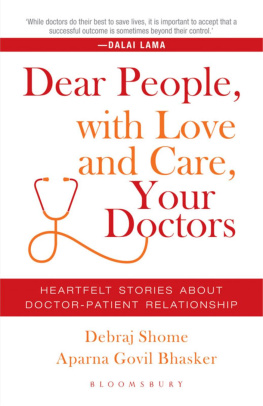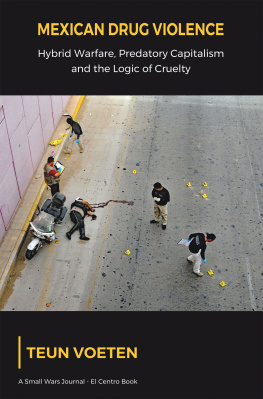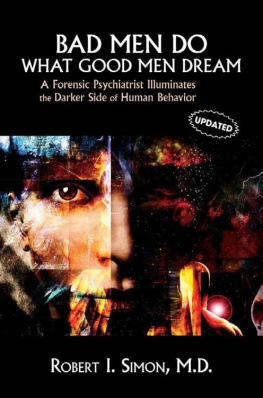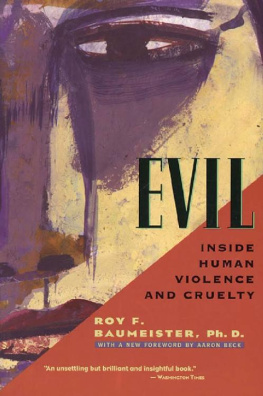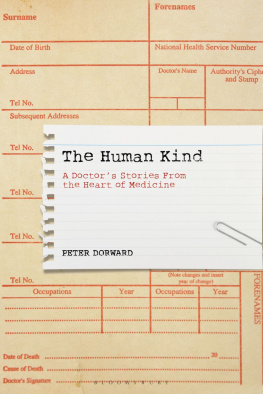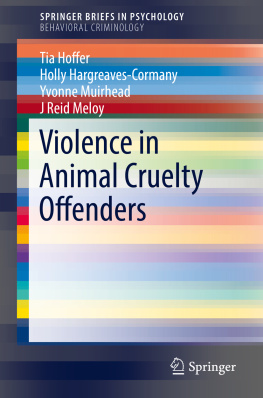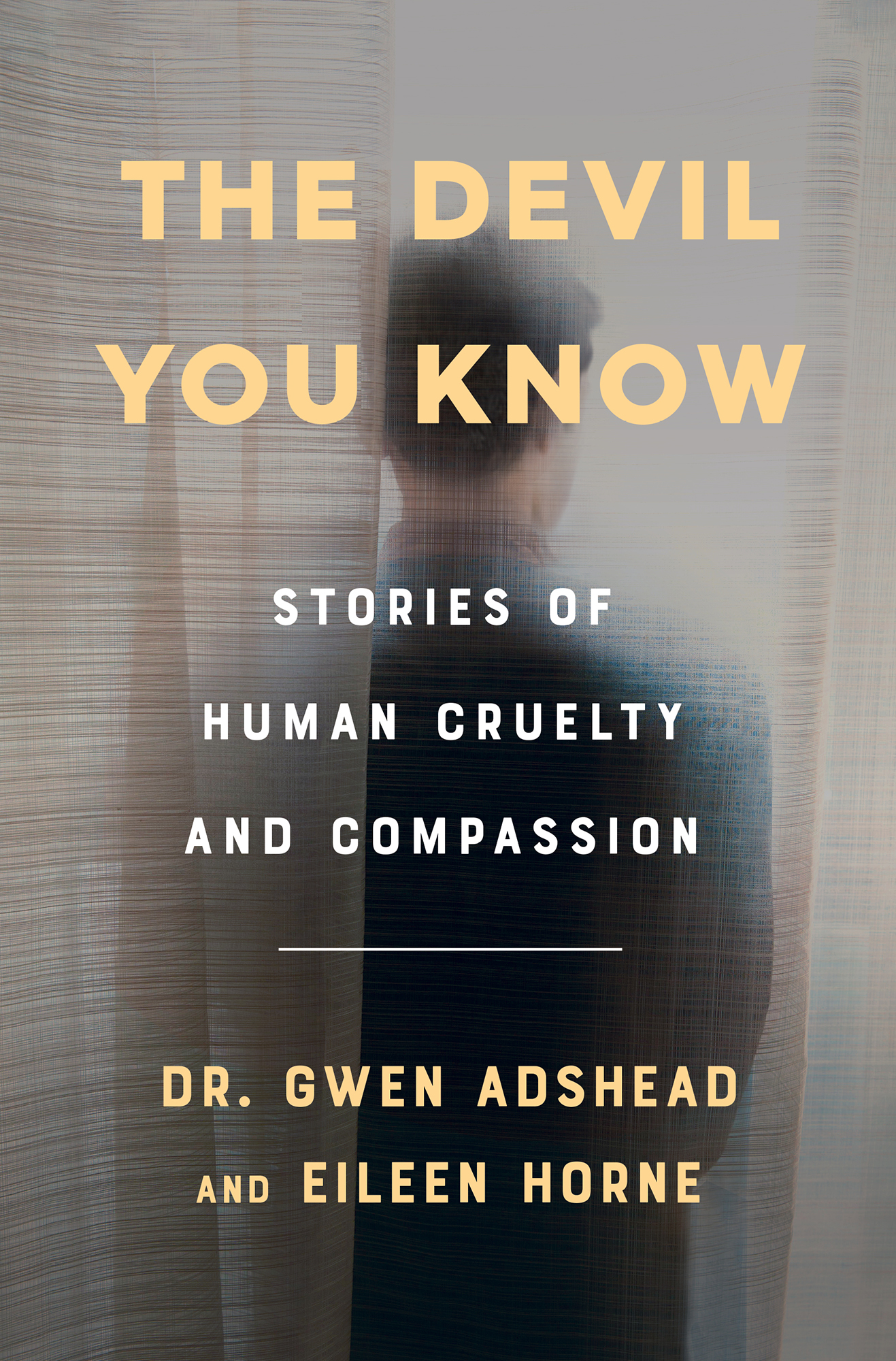Contents
Guide
The Devil You Know
Stories of Human Cruelty and Compassion
Gwen Adshead and Eileen Horne
To Laura, whose Spirit brought us together
The reason for evil in the world is that people are not able to tell their stories.
CARL JUNG , Freud Letters, Vol. 2
INTRODUCTION
In that distant time when people on airplanes used to talk to each other, Id sometimes get asked what I did for a living. Im a psychiatrist and psychotherapist who works with violent offenders, I would reply. Mild curiosity would shift to amazement. You mean you actually talk to those people? This could lead to an impromptu lecture about what a waste it was to bother with such monsters; or Id get more of a bemused But they cant be helped, arent they born that way? The occasional British fellow passenger might lean in and offer, sotto voce, Frankly, I think Parliament ought to bring back hanging. Nowadays, on the rare occasions when anyone starts up a chat while were fastening our seatbelts, Im inclined to tell them Im a florist. But I think that everyone who is both fascinated and repelled by human cruelty deserves a better and more honest response about the treatment of violence and those who perpetrate it, and that is my aim with this book.
The title comes from the Latin proverb which suggests that the devils we know are less risky than the ones we dont. If my fellow passengers were a therapy group, I might test out their symbolic thinking skills by asking them to consider this saying, and what it suggests to them. Id have high hopes of a hypothetical airplane seatmate therapy group, likely a chatty, sociable bunch. We could open up a discussion by talking about the familiar devils of religion or fantasy. What about the devil we dont know? I might prompt. Who is that for you? Obviously, its something alien, someone might offer, like one of those terrible people you work with. In time, I hope the group would come to discover that it could also signify a cruel and belittling self that lives in all of us. Accepting that wont come easy for some; to paraphrase the beautiful words of Lears daughter, We ever but slenderly know ourselves.
In the following stories I will show what it is that my colleagues and I do with those people, and how and why listening and compassion can make a difference. I dont judge those who might disagree, just as I dont judge my patients, and I completely understand why people have strong opinions about my work. Everyone is fascinated by what we call evil, that human capacity for violence and crueltymore than enough proof of this is found in the mirrors that are our news and entertainment media. Even as global data show violence of all kinds trending steadily ever-downward in the modern era, our appetite to know more about it has increased. I include myself in this; I chose this career, after all.
Back when I was in medical school in the 1980s, psychiatry was still a specialism that was often overlooked or discounted, despite wide acknowledgment since classical times that a healthy mind was essential to a healthy body. (And, as a colleague of mine likes to say, Psychiatrists are doctors who look after the only part of the body that votes.) As a student, I briefly considered pursuing orthopedic surgery, probably because I wanted to fix things and was attracted by its pragmatic effectiveness. But I was also drawn to psychiatry and its relationship with human identity and communication; I thought it would be profoundly stimulating, both intellectually and emotionally. I saw that the complexity and power of the human mind were immense and that changing minds had significance both personally and politically.
Over the centuries, humans have often turned to the current technologies for metaphors about the mind, and I guess the most common one we hear these days is that of the mind as a computer: a machine where identity is hardwired. Data about thoughts or emotions are processed and filed; we switch modes when carrying out different functions. Such a model of the mind lends itself to some kinds of research but has little to say about the complexity of human experience, especially in the relational space in which we all live our lives. Physicists like Carlo Rovelli tell us that the universe is relational, therefore so the mind must be, and if that is the case, then we need better metaphors, ones that reflect the organic, ever-evolving nature of psychological experience.
I prefer to think of the mind as a coral reef: ancient, layered, and mysterious, not without shadows and risk but containing a nourishing diversity; it might appear chaotic, but it is a complex and structured ecosystem, endlessly fascinating and essential to human life. Under environmental stress, many reefs will bleach out and wither, but science has also shown they can be responsive to intervention and made more resilient. As a student, I soon learned that the study of psychiatry would require a deep dive below the surface, into a darkness where things of great beauty as well as danger might appear. It would take time to acclimatize myself and learn to breathe easy.
Since then, a long professional voyage has continually inspired in me the awe and wonder that I associate with the ocean and its hidden depthsI love that e. e. cummings idea that it is always ourselves that we find in the sea. It has been immensely rewarding work, and often unpredictable; it has shown me how good and evil, ideas of right and wrong, as well as identities like victim and perpetrator, are not set in stone and can coexist. When I started out, I thought the work I was doing was about making people feel better, but time has taught me that it was about helping them to better know their minds, which is quite another matter. The process is not painless for my patients, and there has been turbulence for me too along the way. I have found that it is inevitable that I will experience some distressing feelings, though they tend toward deep sadness and frustration more than horror or disgust. It is my job to recognize those responses and hold them with a kind of compassionate detachment, what Buddhists might describe as hovering in the Bardo.
As my psychiatric training went on, I found out about forensic work, which looks at the minds darker modes that sometimes give rise to risk. The word forensic derives from the Latin forum, a place to hear legal disputes. Beyond providing assessments, making diagnoses and coordinating the care of patients like any other medical specialist, forensic psychiatrists address how a society responds to and treats those people who break the criminal law. The work raises fascinating ethical and legal questions about responsibility, agency, and blame for actions done when people are mentally unwell. Many forensic psychiatrists work in secure hospitals as members of a team of professionals providing coordinated care; they are like dive buddies who discuss a plan and share responsibility for each others safety. I am by nature a collaborator, as demonstrated by my work as a group therapist (and, indeed, by the writing of this book), so forensic work seemed an ideal choice for me.
Once I qualified in forensic psychiatry, I soon realized that I wanted to train as a psychotherapist as well. In the early years of the profession, most psychiatrists were also therapists, but by the late twentieth century these were seen as separate disciplines and it was considered unusual for a psychiatrist to also offer psychological therapy. Like other medical specialists, they would generally act as case managers, with an overview on assessment and treatment. But, for me, the art of psychiatry was in the dialogue and the story of peoples lives: I wanted to work in depth with them and provide time and space for reflection. In the course of my further training to become a therapist I got involved in particular areas of research such as maternal violence, trauma and group work, as well as medical ethics and the treatment of doctors. These and much more are woven into the tapestry of the lives that follow. An important thread throughout has been my study of childhood attachments in relationships and their association with later violence. This had a major influence on my thinking about human behavior, as I will show.


